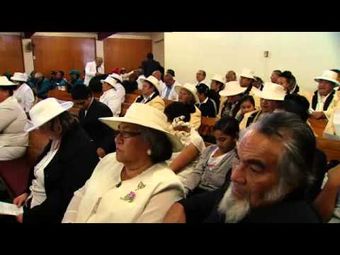Connect with Massey University
Contact this content partner to get more information about this item.
Ko te whare whakamana : Māori language revitalisation : a thesis presented for the degree of Doctor of Philosophy in Māori Studies at Massey University, Palmerston North, New Zealand
- Description:
- Efforts to revitalise the Māori language began in earnest with the establishment in 1981 of the first Kōhanga Reo (Māori language pre-school). Since this time, the growth of Māori medium education has been significant, and has also been complemented with language intitiatives in broadcasting and the public sector, including government departments. Some iwi (tribes), most notably Ngāti Raukawa k...
- Display date:
- 2001
- Format:
- Thesis
- Collections:
- Massey Research Online
- Publisher:
- Massey University
- Content partner:
- Massey University
- Availability:
- Not specified
-
Copyright status: All rights reservedFind out more about what you are able to do with this itemThis item is all rights reserved, with means you'll have to get permission from Massey University before using it. For more information, please see our use and reuse page.More informationMassey University has this to say about the rights status of this item:
The Author
What can I do with this item?Non-infringing useNZ copyright law does not prevent every use of a copyright work, and this item may be hosted by an international institute or organisation. You should consider what you can and cannot do with a copyright work.No sharingYou may not copy and/or share this item with others without further permission. This includes posting it on your blog, using it in a presentation, or any other public use.No modifyingYou are not allowed to adapt or remix this item into any other works.No commercial useYou may not use this item commercially.
Related items
Welcome and warm Pasifik greetings
The information on this site has been gathered from our content partners.
The names, terms, and labels that we present on the site may contain images or voices of deceased persons and may also reflect the bias, norms, and perspective of the period of time in which they were created. We accept that these may not be appropriate today.
If you have any concerns or questions about an item, please contact us.
